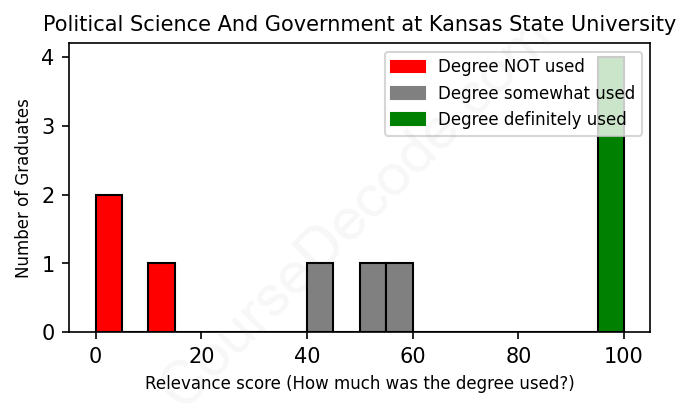
First, some facts. Of the Political Science And Government graduates from Kansas State University we've analyzed , here's how many have used (or NOT used) their degree in their career:

These are estimates based on AI analysis of 10 LinkedIn profiles (see below).
The verdict? Significantly below average. Overall, with an average relevance score of 56%, Political Science And Government graduates from Kansas State University have a much lower likelihood (-11%) of finding work in this field compared to the average graduate across all fields:
And for comparison, here's the chart for all profiles we've looked at across all degrees.
Also, after graduating, 60% of these graduates have pursued further education other than another Bachelor's degree (such as a Masters degree or other), compared to the average across all profiles of 35%. This suggests you may need more than just a Bachelors degree to be competitive as a Political Science And Government graduate.
See the details:
|
Relevance score: 58% We think this person has gone into a career only somewhat relevant to their degree. We think this person has gone into a career only somewhat relevant to their degree.
DEGREE INFOGraduated in 2018 from Kansas State University with a Bachelor's degree in Political Science And Government. Also pursued further education since (see below). JOB HISTORY SINCE GRADUATIONFinance Intern City of Topeka May 2018 - Mar 2019 External Affairs Intern  Sunflower Electric Power Corporation Jun 2019 - Aug 2019 FURTHER DEGREES DONE SINCE GRADUATINGMaster's degreeKansas State University 2019 - 2020 ABOUTI have a bachelors in political science from Kansas State University and I am currently pursuing a Masters in Public Administration from Kansas State University. |
The top 10 most common jobs done by the graduates we've analyzed (ranked most common to least) are:
When looking at the jobs held by graduates from Kansas State University with a degree in Political Science and Government, it seems like they have ended up in a pretty mixed bag of careers. A significant portion of those who've graduated in recent years have found roles related to the legal field, such as law clerks, assistant district attorneys, and legal interns. These positions directly relate to their degree and draw on the knowledge of government structures and policy that they learned in school. In fact, roles like those in the Santa Cruz District Attorney's Office or at the U.S. Committee for Refugees and Immigrants are prime examples of how political science graduates can apply their education in meaningful ways.
On the other hand, there are many graduates who have taken on jobs that don’t really connect with political science at all. For instance, roles like food inspectors or technical positions in broadcasting don’t require much of the political knowledge or skills they studied. Even within the military-related jobs, while you could argue there’s some relevance due to leadership or organizational skills, the core political science concepts aren't usually a daily focus. Overall, it seems that while some graduates are thriving in roles directly related to their degree, others have ventured far away from the political world altogether, landing in jobs that may not utilize their educational background effectively. It's a real mixed bag, reflecting both the versatility of a Political Science degree and its limited application in certain fields.
Here is a visual representation of the most common words in job titles for Political Science And Government graduates (this is across all Political Science And Government graduates we've analyzed, not just those who went to Kansas State University):

When looking at the career trajectories of graduates from Kansas State University with a degree in Political Science and Government, it seems like there’s a mixed bag of outcomes, especially early on after graduation. Many of the alumni began with roles tightly tied to their field, like legal internships, public service positions, or military roles. For instance, those who graduated in 2011 and 2012 pursued legal careers, snagging internships and positions as district attorneys or law clerks soon after. This indicates a decent alignment with their degree, especially for those heading into law. Others found themselves in various roles, like quality assurance or broadcasting, which, while not directly linked to political science, showcase adaptability in their job choices.
Fast forward five to ten years after graduation, and we see some graduates moving into established professions that often reflect a blend of their original degree and other skills they developed. For example, several alumni shifted into legal professions after gaining experience through internships, becoming assistant district attorneys or professors, which is typical for political science grads. However, some people have drifted away from political science-related careers into areas like engineering or broadcast media, suggesting that while their degree provided a solid foundation, it didn't strictly dictate their career paths. Overall, while some graduates have carved out successful and relevant careers in politics, law, or public service, others have taken diverse paths, showing that a political science degree can lead to a range of opportunities—or for some, a bit of a detour into unrelated fields.
Honestly, a Bachelor’s degree in Political Science and Government at Kansas State University, like most programs in this field, can be a mixed bag. It's not considered super easy, but it’s also not impossible. You’ll dive into a lot of reading, writing essays, and engaging in discussions about political theories, public policies, and global events, which can definitely be challenging if you’re not super into that stuff. If you're someone who enjoys keeping up with politics and likes to argue about it, you might find it pretty interesting and manageable. Just be prepared to put in some work, especially during those big paper deadlines or exams! Overall, it’s about average in terms of difficulty compared to other Bachelor’s degrees.
Most commonly, in the LinkedIn profiles we've looked at, it takes people 4 years to finish a Bachelor degree in Political Science And Government.
Looking at these grads from Kansas State University, it seems like they’ve had pretty decent success in terms of jobs, but their earnings likely vary a lot depending on the specific roles they've landed. The ones in the military and government positions, like the food inspectors and army officers, typically earn stable salaries, with some roles offering good benefits and potential for promotions over time. On the legal and technical side, the graduates started off with internships and lower-level roles, but those tend to pay well as they gain more experience. The newer grads, especially those just starting out like the paralegal, may not be earning a ton right off the bat, but they’re building valuable experience. Overall, it looks like they’re doing well enough, just with some having a clearer path to higher earnings than others.
Here is a visual representation of the most common words seen in the "about" section of LinkedIn profiles who have a Bachelor degree in Political Science And Government (this is across all Political Science And Government graduates we've analyzed, not just those who went to Kansas State University). This may or may not be useful:

Here are all colleges offering a Bachelor degree in Political Science And Government (ordered by the average relevance score of their Political Science And Government graduates, best to worst) where we have analyzed at least 10 of their graduates: